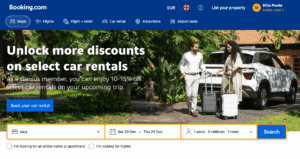Make Money on Your Domain With Domain Leasing
Domain leasing is a viable solution for owners who don’t have a use for their name – and also for would-be buyers who can use it but can’t afford it. NameExperts.com Principal Joe Uddeme explores how it works. Life sometimes doesn’t give you the hand you were hoping for. You were planning to snap up cars.com for your used automobile business, only to find it was first registered decades ago and went on to sell for hundreds of millions of dollars. Or, more probably, you have a family business with a strong brand name, but someone else owns the perfect URL. Not having access to it is getting in the way of business growth. Domain names are an asset class that people speculate on. Some even have domain consultants advising them on their portfolio decisions. As a result, millions of domain names are simply ‘parked up’. While that might be bad news if you want to secure a specific .com domain name that either isn’t for sale or has a price tag that’s beyond your budget, it doesn’t mean all is lost. Welcome to the world of domain leasing. Key Takeaways What is domain leasing? 4 ways to make money from a domain name you own Why you may want to lease a domain Understanding the downsides of leasing a domain How to lease a domain for your business What Is Domain Leasing? Domain name leasing refers to renting a domain name for an extended period, usually a year or more. An individual or business pays to rent a domain name owned by another individual or corporation. This arrangement allows the lessee to use a domain name for a long time without paying a substantial sum outright. Domain leasing is usually done for valuable domain names that are too expensive for the lessee to acquire completely. How Does This Compare To Renting? Renting and leasing are the same thing, except for the latter being for longer periods. Domain leasing agreements usually cover at least one year compared to typical renting, which covers a few months. What Are the Ways You Can Lease Your Domain? You can lease your domain through the following ways: Periodic payments: The lessee can pay for their lease at specific intervals. For example, they could pay monthly or quarterly for the period the lease lasts. This method gives the domain owner stable income they can count on during the leasing period. Percentage of profit: You can agree to take a percentage of profits the lessee makes from the website using your domain name. This method is riskier, as there’s no guarantee the website will be profitable. However, there’s a higher upside if the website becomes a profit-making enterprise. Royalties: You can collect a fixed percentage of the lessee’s net revenue for as long as the lease runs. Ownership percentage: You can request a percentage of shares in the domain lessee’s company. This method is risky but can earn you significant income if the website becomes a viable business that another corporation eventually acquires. Benefits Of Leasing For Domain Owners Provides Another Way To Monetize A Domain Monetizing a domain is better than having it sit idle. If you have a valuable premium domain you’re not using, leasing it out can earn you passive income. You can always reclaim your domain once the lease expires. Opportunity For Investors With Domains In Their Portfolio Many investors specialize in acquiring domain names for profit. Investors with a portfolio of valuable domain names can lease them for a long time and get stable income. Consistent Revenue Stream Renting out a domain for periodical payments generates consistent income for the owner. The owner is sure of getting a specific return on the capital they spent acquiring the domain as long as the lease lasts. The Domain Value Increases Due To Usage Active domains are more valuable than inactive ones because of online traffic. The higher the traffic to a domain, the more valuable it is. Leasing out a domain increases its value in the long term, which the owner can realize by selling it later. Long Term Financial Advantage Receiving periodic lease payments can generate more revenue in the long term compared to selling your domain for a lump sum. It’s why many owners lease domain names out despite getting lucrative purchase offers. Benefits Of Domain Leasing For End Users Spend Less Money Upfront Valuable domain names can run into tens or hundreds of thousands of dollars, which is risky to spend upfront. Leasing allows you to build a business with the domain and make periodic payments from the revenue you generate, which is cost-effective. Lesser Burden If the website for whcih you use the leased domain fails, you can terminate the lease and return the domain to the owner. If you owned the domain outright, that means having another asset you must keep renewing or find a potential buyer for. Opportunity To Buy the Domain In the Future Some lease terms include an option to acquire the domain outright later. This way, you can start the website to see if it succeeds. If it does, you can acquire full domain ownership and gain more control over your website’s fate. Access To Premium Domain Names At A Lower Cost Domain leasing lets you use very valuable domain names for lower costs. These valuable domain names can draw more organic traffic to your website. Avoid Legal Liability Issues Leasing a domain name means avoiding any legal liabilities concerning the domain’s ownership. Any legal dispute is the concern of the owner and not the lessee. Downsides Of Leasing A Domain No ownership Not having full ownership of your domain is a risk. The owner can terminate the lease anytime and pay any agreed monetary penalties for early termination. It could be at a crucial time when your website is booming, and losing the domain would affect it negatively. Less Control You have less control over your website than the domain owner. Let’s say your website grows big and becomes valuable; its fate lies more in the hands of the domain owner than yours. They could use that leverage to extract concessions from you. The Domain Value You Build Is Never Yours Drawing traffic to your website increases the value of its domain name. Yet, the owner will capture that value instead of you working hard to maintain the website. Where Can You Lease A Domain Domain Marketplaces Many domain name marketplaces allow owners to list and lease their domain names. This method is beneficial because owners can easily find customers to lease domain names to. The domain leasing services generate a lot of traffic, giving you higher chances of finding an interested lessee. Domain Brokers You can approach a domain broker to lease your domain for you. Domain brokers are experts in negotiating domain deals and can fetch you the best possible price. They’ll collect a fee for their service, either a flat rate or a percentage of the lease value. Word Of Mouth You can spread the word to your social and business circles about a domain name you want to lease out. You may find a trusted lessee this way and negotiate a good deal to earn a stable income. Forums You can join webmaster forums and post about the domain name you want to lease. You may find a buyer this way, but ensure you use a transaction escrow service because you’re dealing with a stranger. Leasing versus Buying a Domain While leasing a domain might be a good option for some businesses, buying your domain outright continues to be the safest and most secure option for guaranteed success. About the author Joe Uddeme is Director and Principal of Name Experts, one of the world’s leading domain name brokerage services. He has overseen domain name sales and acquisitions totaling more than $150 million and is renowned worldwide as a go-to expert in buying and selling premium domains. He also advises on leasing strategy and portfolio management. Contact us at: [email protected]







